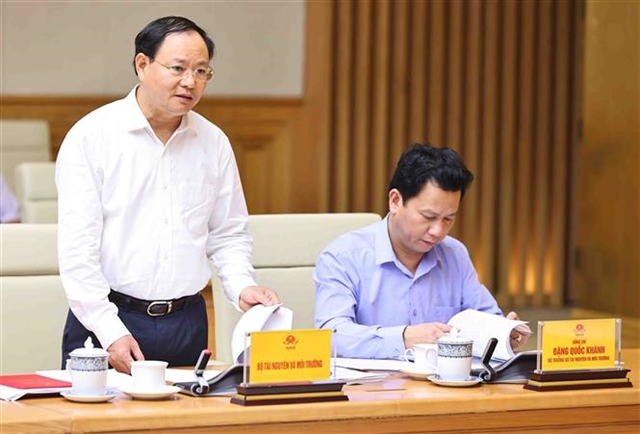 |
| Deputy Minister of Natural Resources and Environment Lê Minh Ngân speaks at the meeting. VNA/VNS Photo |
HÀ NỘI – Deputy Prime Minister Trần Hồng Hà has praised the hard work of all those involved in the draft decree on land reforms, which are due to be imposed five months earlier than anticipated.
He chaired a meeting with representatives from ministries, sectors, associations and experts, connecting online with 63 localities, to discuss the draft detailing the implementation of several provisions of the Land Law.
The Deputy Prime Minister acknowledged and highly appreciated the active, direct and substantive participation of ministries, sectors, localities, associations, businesses and experts in the development, contribution and completion of sub-law documents, guiding the Land Law, the Real Estate Business Law and the Housing Law, which are proposed to take effect five months earlier than stipulated, on August 1.
"Legislation must adhere closely to practical realities to resolve difficulties in law enforcement, protect the legitimate interests of businesses and citizens and foster socio-economic development," he said.
The Deputy PM requested the Ministry of Natural Resources and Environment coordinate with other ministries and sectors to supplement and complete the draft, ensuring consistency, uniformity and to avoid conflicts with other laws within the legal system.
This includes content related to various laws such as regulations on land reclamation, ensuring consistency and uniformity in decentralisation in land management, identifying disaster prevention and climate change response projects with sea encroachment areas and the application of land requisition provisions in emergencies, disaster prevention, or force majeure situations.
He asked the Ministry of Natural Resources and Environment to incorporate feedback from the meeting to revise the Decree in terms of drafting techniques, ensuring it fully covers the scope of the Land Law.
Clarifying procedures and criteria for sea encroachment projects
Deputy Minister of Natural Resources and Environment Lê Minh Ngân stated that the draft Decree has incorporated and refined feedback from government members, revising certain regulations.
These include determining land types in cases of lacking documentation or where land documented differs from land classification or current use status as stipulated by the Land Law; financial revenue sources for the Office and Branch Office of Land Registration; national, regional, technical and specialised planning orientations; and responsibilities for the Ministry of Defence and the Ministry of Public Security concerning land recovered and transferred to local authorities for housing projects for the people's armed forces.
Leaders from various sectors focused on clarifying the draft Decree's structure, analysing elements that need incorporation and refinement based on feedback.
This includes regulations on national and regional planning orientation, technical and specialised planning, land recovery issues, annual land use fees for defence and security land, management and use of boundary records and maps, sea encroachment projects, handling interspersed land, short-term land fund management and contributing land use rights for project construction.
Nguyễn Chi Lan, Deputy Director of the Department of Civil and Economic Law (Ministry of Justice), affirmed that the draft Decree met the requirements and objectives set out in its development, ensuring constitutionality, legality, and consistency within the legal system. The Ministry of Justice would continue to coordinate with relevant ministries and sectors to further review, supplement and complete the Decree.
Speaking online, the Vice Chairman of the People's Committee of Cà Mau Province, Lê Văn Sử, highlighted the practical reality where sea embankment projects protecting the coastline could also be seen as sea encroachment projects and suggested clarifying the nature of such projects.
A representative from Hồ Chí Minh City pointed out that some city districts were operating under urban governance without district-level People's Councils, necessitating a review and specification in the Decree.
Some held the view that the draft Decree has institutionalised the provisions of the Land Law related to decentralisation and assignment of responsibilities to provincial and district-level governments in land management and use. The draft also promotes administrative reform, reducing procedures to save time and costs for citizens and businesses. VNS